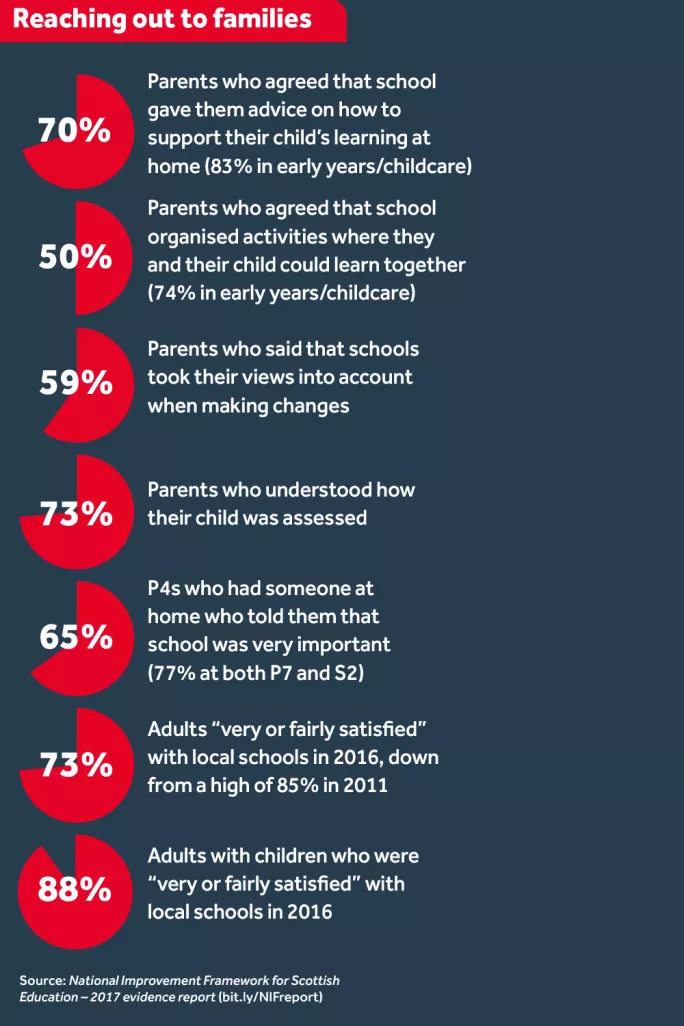Schools ‘must open their doors to engage parents’

They hold the keys to pupils’ educational success - yet many feel remote from school and that they are fumbling in the dark when trying to help children learn.
These are the people most likely to be orbiting pupils in the 75-85 per cent of their waking hours that they are estimated to spend outside school: parents.
Tes Scotland analysis of survey responses from thousands of parents sheds light on some worrying feedback. Despite the rhetoric about “parental engagement” in Scottish education in recent years, many parents struggle to see it in practice - and the picture is possibly worse than suggested in the survey, because the responses were most likely to come from families that are more involved in school life. Now a national organisation for nurseries - which are shown in inspection analysis to have stronger links with parents than schools - has called on schools to follow their lead and throw open their doors to parents.
Learning together
Research shows that “parental involvement” is “consistently associated with pupils’ success at school” - although it is less clear exactly what type of parental involvement increases attainment.
In the National Improvement Framework for Scottish Education (NIF) evidence report (see bit.ly/NIFreport), 70 per cent of 4,603 parents at schools inspected between January and June 2017 agreed that their school gave them advice to on how to support their child’s learning at home. Only half said the school organised activities where they and their child could learn together.
Joanna Murphy, chair of the National Parent Forum of Scotland (NPFS), says “we have come a long way with parental engagement and involvement” but that “more can certainly be done”. In a NPFS survey last year, around three-quarters of parents said they had been given an opportunity to be included in their child’s education, but Murphy sees “a lack of understanding among many practitioners and families as to what learning at home really is and can be”.
The NPFS has also found substantial variations in levels of commitment to parental involvement across Scotland.
Murphy is concerned, too, about a “lack of support for parents with literacy, communication or language difficulties” and schools’ growing reliance on technology for learning at home, which disadvantages families without a computer or good broadband.
Inspection data in the NIF report - based on responses from 819 parents of children in pre-school settings inspected in 2017 - shows higher levels of involvement than with parents of schoolchildren.

Purnima Tanuku, chief executive of the National Day Nurseries Association (NDNA) Scotland, says: “Once a child starts school, parents lose that daily contact with the teacher. They no longer go into school with their child but wait outside. Schools good at engaging with parents will encourage parents to go into their child’s classroom regularly and have brief chats with the teacher wherever possible.” She advocates “a more ‘open-house’ policy” where parents - even of older pupils - are “actively encouraged to see what their child has done during the day and ask teachers regular questions”.
Maximising contribution
Eileen Prior, executive director of the Scottish Parent Teacher Council, warns that it is mostly parents “who are already engaged” who take part in surveys run by school inspectors, so the survey data is likely to overestimate parental involvement. She also questions the value of some of what is described as parental involvement or engagement, explaining that “a great deal of activity goes on around parents - for example, sending out newsletters or organising events - which is a “starting point” but not nearly enough to maximise parents’ contribution to learning.
Parents will make a far bigger difference if they are at the centre of what schools do and involved in key decisions, Prior argues.
NPFS research has shown that families find it particularly hard to support their children in secondary school. Jim Thewliss, general secretary of School Leaders Scotland, which represents secondary heads, says the NIF report, overall, shows a “move forward” in parental engagement and offers “much for us to be satisfied with, in that over four out of five parents were happy with their child’s school and were comfortable in approaching the school”. He believes that, while there is still some way to go, it is “healthy” to see seven out of 10 parents agreeing that their school gave them advice on how to support their child’s learning at home.
An Education Scotland spokeswoman said: “Parent engagement is a key driver in the National Improvement Framework. Education Scotland will continue to work with colleagues and partners to ensure we support and enhance parental engagement throughout a child’s education experience.”
You need a Tes subscription to read this article
Subscribe now to read this article and get other subscriber-only content:
- Unlimited access to all Tes magazine content
- Exclusive subscriber-only stories
- Award-winning email newsletters
Already a subscriber? Log in
You need a subscription to read this article
Subscribe now to read this article and get other subscriber-only content, including:
- Unlimited access to all Tes magazine content
- Exclusive subscriber-only stories
- Award-winning email newsletters
topics in this article



